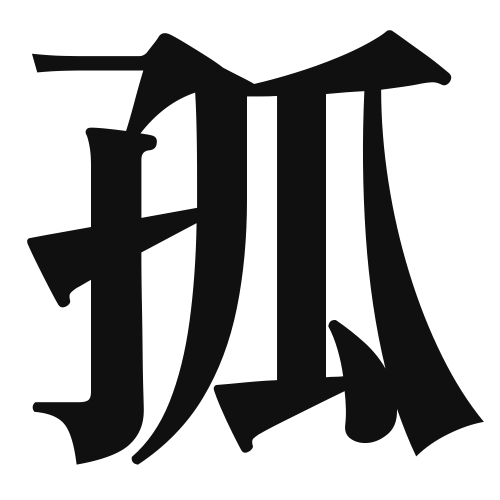1. Overview of Meaning
The kanji “孤” (ko) primarily means “lonely” or “isolated.” It conveys a sense of being alone or separated from others, often with a connotation of sadness or solitude.
2. Formation and Radical
Formation of the Kanji: The kanji “孤” is a phono-semantic compound, which means it combines both meaning and sound elements. The left part, “犬” (inu), represents a dog, while the right part, “古” (ko), suggests something old or ancient. Together, they evoke the idea of a solitary being, akin to a dog left alone.
Radical: The radical of “孤” is “犬” (inu), which relates to animals, particularly dogs, and emphasizes the theme of loneliness associated with being apart from others.
3. Examples of Usage
Common Words and Phrases:
- 孤独 (kodoku) – loneliness
- 孤立 (koritsu) – isolation
Example Sentences in Daily Conversation:
- 彼は孤独を感じている。 (Kare wa kodoku o kanjite iru.) – He feels lonely.
- 孤立した状況から抜け出したい。 (Koritsu shita jōkyō kara nukedashitai.) – I want to escape from this isolated situation.
4. Synonyms and Antonyms
Similar Kanji:
- 寂 (jaku) – meaning “lonely” or “quiet,” but often with a more peaceful connotation.
- 独 (doku) – meaning “alone” or “independent,” which can imply a positive sense of solitude.
Antonyms:
- 賑 (nigi) – meaning “lively” or “crowded,” representing the opposite of loneliness.
- 共 (tomoni) – meaning “together,” which emphasizes companionship and community.
5. Cultural and Historical Background
Relation to Japanese Culture: The concept of loneliness is often explored in Japanese literature and art, reflecting the deep emotional landscape of individuals. The kanji “孤” resonates with themes of solitude found in traditional poetry and modern narratives.
Proverbs and Idioms:
- 孤高の存在 (kokō no sonzai) – meaning “a solitary existence,” often used to describe someone who stands apart from the crowd due to their unique qualities.
- 孤立無援 (koritsu muen) – meaning “isolated and without support,” used to describe a situation where someone is alone and unsupported.
